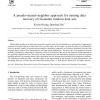Free Online Productivity Tools
i2Speak
i2Symbol
i2OCR
iTex2Img
iWeb2Print
iWeb2Shot
i2Type
iPdf2Split
iPdf2Merge
i2Bopomofo
i2Arabic
i2Style
i2Image
i2PDF
iLatex2Rtf
Sci2ools
PRL
2002
2002
A pseudo-nearest-neighbor approach for missing data recovery on Gaussian random data sets
Missing data handling is an important preparation step for most data discrimination or mining tasks. Inappropriate treatment of missing data may cause large errors or false results. In this paper, we study the effect of a missing data recovery method, namely the pseudo-nearest-neighbor substitution approach, on Gaussian distributed data sets that represent typical cases in data discrimination and data mining applications. The error rate of the proposed recovery method is evaluated by comparing the clustering results of the recovered data sets to the clustering results obtained on the originally complete data sets. The results are also compared with that obtained by applying two other missing data handling methods, the constant default value substitution and the missing data ignorance (non-substitution) methods. The experiment results provided a valuable insight to the improvement of the accuracy for data discrimination and knowledge discovery on large data sets containing missing valu...
Related Content
| Added | 23 Dec 2010 |
| Updated | 23 Dec 2010 |
| Type | Journal |
| Year | 2002 |
| Where | PRL |
| Authors | Xiaolu Huang, Qiuming Zhu |
Comments (0)

